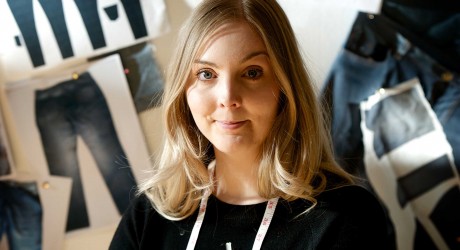A SCOTTISH student has created a pair of jeans using a fibre made from sustainable wood instead of cotton.
The jeans have cotton-like qualities but only use one fifth of the water, energy and chemicals that’s needed to manufacture conventional jeans.
Dawn Ellams, a PHD researcher at Heriot-Watt University’s School of Textiles and Design, also used digital printing technology to create a stone-washed denim effect on the textile.
Manufacturing one pair of cotton denim jeans uses on average 42 litres of water and is energy intensive. Conventional denim production methods can also require up to 15 dyeing vats and an array of harmful chemicals.
Now, Dawn’s research has identified several areas within the manufacturing process that offer opportunities for saving water and reducing carbon emissions.
She said: “The sustainability issues associated with the manufacturing of cotton garments are already well understood, yet the use of cotton shows no sign of diminishing.
“The research challenged the design and manufacture of denim jeans, probably the most iconic use of cotton. The overall aim was to reduce greenhouse gas emissions and water use associated with conventional manufacturing for denim jeans.”
Dawn worked closely with Jim McVee, business development manager at the School of Textiles & Design, who was able to assist her with the development of the denim garment.
The ‘no-cotton’ jeans are made using Tencel®, a fibre created by man-made cellulose fibre production company, Lenzing AG.
Michael Kininmonth, business development and project manager for Lenzing AG, said: “When I speak to textile students I try and impress on them that sustainable issues are now at the top of the agenda of many leading companies within the textile supply chain.
“This newly developing business climate provides students a mandate to think in more radical ways and challenge long established conventional products and processes.
“Innovation is the life’s blood of today’s denim industry and there are strong environmental reasons why this production route, if honed,might have a serious chance of being adopted commercially.”
ENDS
For more information or images, please contact Julie.watt@pagodapr.com or call 0131 556 0770.
Notes to editors:
1. TENCEL® is the brand name of lyocell fibre as produced by the Lenzing Group. See www.lenzing.com/en/fibers/tencel It is a natural cellulosic-based product, extracted from wood.
2. Heriot-Watt University specialises in science, technology, engineering, business and design, with a particular focus on developing solutions to critical global issues, such as climate change and energy. Established in 1821, Heriot-Watt University has campuses in Edinburgh, the Scottish Borders, Orkney and Dubai, and is investing £35 million in a new campus in Malaysia. The University was named Scottish University of the Year 2012/13 (for the second year running) In The Sunday Times 2013 University Guide as well as UK University of the Year 2012/13 for student experience. In the National Student Survey 2012, they were named No 1 in Scotland and No 4 in UK (based on responses to all questions from FT degree students). The University is In the Top Ten for graduate employment in the UK (over 94 per cent of graduates are in employment or further study within six months of graduation).
3. The School of Textiles and Design at Heriot-Watt University (SoTD) was established in 1883 to lead the textile industry in training and education. Its portfolio continues to evolve and reflect current and future developments in textiles, fashion and design. Today SoTD has a reputation as one of the world’s leading education and research institutions with specialist resources that are among the best in the world.
MEDIA RELEASE posted by Pagoda PR. You too can post media releases (aka press releases) on allmediascotland.com. For more information, email here.
Contact: Pagoda Public Relations
Phone: 0131 556 0770
Email: julie.watt@pagodapr.com
Website: http://www.pagodapr.com






